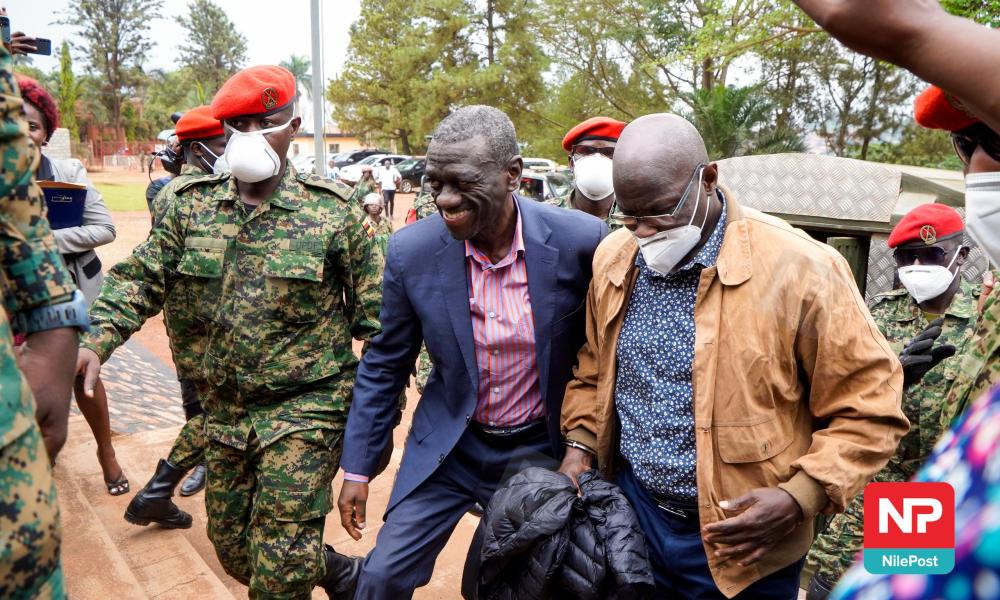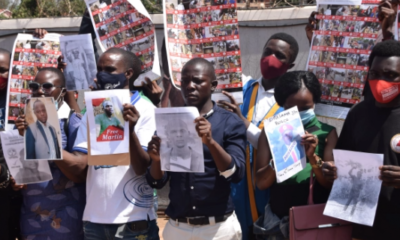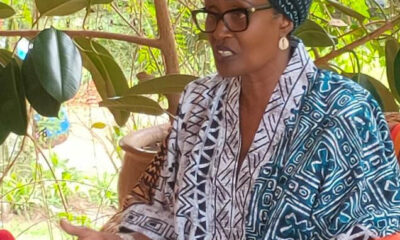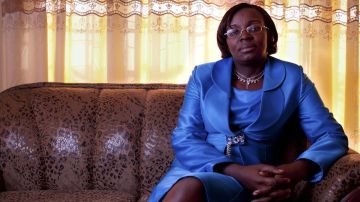
Besigye Arrest : Kenya Is No Longer Safe for Ugandan Human Rights Activists and Opposition Members
Kenya has long been regarded as a beacon of refuge for political dissidents and activists from neighboring countries. However, recent incidents involving Ugandan human rights activists and opposition leaders cast doubt on this reputation. Increasing allegations of harassment, abductions, and deportations have created a chilling environment for those seeking safety within Kenya’s borders.
Besigye’s Ordeal: A Wake-Up Call
The alarming case of Dr. Kizza Besigye, a prominent Ugandan opposition leader, underscores this issue. Besigye, known for his vocal criticism of President Yoweri Museveni, went missing in Kenya, only to resurface in a Ugandan military court under accusations of compromising Uganda’s national security. Reports suggest Besigye was abducted in Nairobi, transported to Uganda, and subjected to charges that many observers deem politically motivated.
His wife, Winnie Byanyima, called for his immediate release, describing the incident as a blatant violation of his rights. This is not the first time Besigye has faced persecution, but his abduction in a neighboring country raises serious questions about Kenya’s role in protecting political refugees.
Kenya has increasingly adopted heavy-handed approaches to opposition and civil unrest. Incidents of police brutality, arbitrary arrests, and violent suppression of protests have escalated. Notably, 36 members of Uganda’s Forum for Democratic Change (FDC) were reportedly detained in Kisumu under harsh conditions and deported back to Uganda to face treason charges. Victims recounted experiences of torture and inhumane treatment, with Kenyan authorities remaining largely silent on these allegations.
These developments signal a significant shift in Kenya’s approach to regional political asylum. Historically, the country played a pivotal role in offering refuge to those fleeing persecution. However, its recent actions suggest complicity in undermining the rights of activists and opposition figures, aligning with authoritarian tendencies in the region.
Kenya must confront this troubling trajectory to preserve its legacy as a defender of democracy and human rights. The international community and regional organizations must hold the Kenyan government accountable for adhering to international laws protecting refugees and activists. Without such efforts, Kenya risks losing its status as a sanctuary for those who champion democratic values.
The experiences of Besigye and others highlight a critical moment for Kenya. As the country navigates its own internal challenges, its stance on human rights and political freedoms will determine its standing in East Africa and beyond. For now, Ugandan activists seeking safety may need to reconsider Kenya as a viable refuge.
Related
Besigye Arrest : Kenya Is No Longer Safe for Ugandan Human Rights Activists and Opposition Members
News
Ugandan Citizen Abducted, Held in Secret Detention for Three Months, Sparks Outrage and Calls for Justice

A disturbing new case of unlawful detention has surfaced, highlighting the ongoing human rights crisis in Uganda. A Ugandan citizen was reportedly abducted and held in a secret facility, known as a “safe house,” for three months, only to be released without charge or explanation. This incident, reported by NTV Uganda, has sparked widespread condemnation and renewed calls for accountability regarding human rights abuses in the country.
While the details surrounding the abduction remain unclear, reports indicate that the individual was taken without due process and held incommunicado—an action that has long been condemned by human rights organizations. The victim’s release, with no charges filed and no clear justification, has angered activists and citizens, who view this as yet another case of egregious abuse of power by the state.
“This is a recurring pattern,” said one human rights activist. “Abductions, secret detentions, and unexplained releases have become all too common in Uganda. These acts violate fundamental human rights and erode public trust in the justice system.”
The use of “safe houses,” unregistered detention facilities reportedly operated by security forces, has been a focal point in numerous allegations of torture and illegal imprisonment. Despite repeated calls from both local and international organizations for their closure and accountability for those involved, little action has been taken to address these violations.
This case underscores the urgent need for reform within Uganda’s security apparatus and greater accountability for human rights abuses. Observers hope that drawing attention to these injustices will spur concrete action to bring those responsible to justice and ensure the protection of basic human rights.
As frustration mounts, calls for both domestic and international pressure to hold the government accountable for such crimes grow louder. “One day, there must be accountability for all these crimes against our people,” stated one social media user, reflecting the sentiments of many Ugandans.
News
NUP Gathering Disrupted: Kyagulanyi Alleges Security Force Harassment and Arrests

National Unity Platform (NUP) President Robert Kyagulanyi has accused Ugandan security forces of using excessive force to disrupt a planned NUP gathering. The allegations were detailed in a statement shared on Twitter, following an event held to honor children of NUP supporters who were killed, disappeared, or detained for their political beliefs.
According to Kyagulanyi, security personnel, under the command of an officer identified as Asiimwe, carried out a preemptive operation early in the morning upon learning of the NUP’s plans. The forces allegedly stormed the premises, arrested workers, and deployed tear gas to disperse those present.
“The criminals under the command of one Asiimwe deployed early morning, arrested our workers, and threw tear gas into our premises. They’ve cordoned off the premises and blocked all people from accessing the place,” Kyagulanyi wrote.
Among those reportedly arrested were Saava Peter, Mudenya Samson, and Turyasingura Samson. Kyagulanyi claimed the detained workers were subjected to beatings and interrogated about their political affiliations, with security operatives labeling them as terrorists.
“These JATT operatives asked the workers who they support politically, branding them terrorists and criminals—their only crime being that they work with us. You can imagine the indignity!” Kyagulanyi lamented.
This incident adds to the growing tension in Uganda’s political climate, where opposition parties frequently accuse the government of stifling dissent. Despite the challenges, Kyagulanyi ended his statement with a message of defiance and optimism, proclaiming, “UGANDA WILL BE FREE.”
NUP Gathering Disrupted: Kyagulanyi Alleges Security Force Harassment and Arrests
News
Sudan Demands Apology from Uganda Over Army Chief Muhoozi Kainerugaba’s Threat to Invade Khartoum

Sudan has demanded an official apology from Uganda over “offensive and dangerous” comments made by the chief of Uganda army staff, who threated to invade Khartoum, the Sudan Tribune has reported.
General Muhoozi Kainerugaba, son of Ugandan President Yoweri Museveni and CDF of the Ugandan army, posted two comments on the X platform on Tuesday in which he threatened “to capture Khartoum” with the support of the US President elect Donald Trump after he takes office. The posts were deleted later.
“The government of Sudan demands and official apology from the Ugandan government for the offensive and dangerous comments of the army commander,” Sudan’s foreign ministry said in a statement that the Sudan Tribune said it has seen.
Sudan Demands Apology from Uganda Over Army Chief Muhoozi Kainerugaba’s Threat to Invade Khartoum









